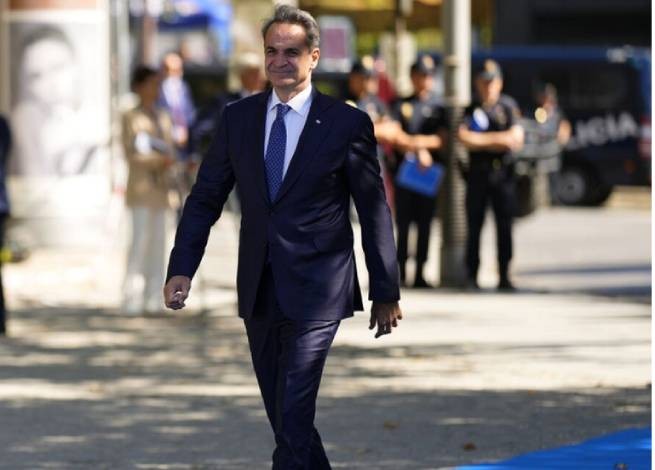Immediately after the end of the informal meeting of the European Council in Granada, Greek Prime Minister Kyriakos Mitsotakis drew attention in his statements to the topic of increasing resources for victims of natural disasters by 2.5 billion euros:
“It is impossible not to increase resources for those affected by the climate crisis. On the budget issue EU “A concrete proposal was put forward, which Greece accepted, but it is impossible to increase resources, for example, for Ukraine – where they are increasing very well – without simultaneously increasing resources for European citizens affected by climate change.”
Details of the Greek Prime Minister’s statements after the end of the informal EU summit, the main topics of which were immigration, EU enlargement, climate change and competitiveness, quotes CNN Greece:
Question: Mr. President, I would like to take the path of expansion. Ukraine is obviously in the spotlight now, and in the run-up to the European Council in December we also saw Mr Zelensky there. What is your position on priorities for the next period, and how will this whole discussion affect the European perspective of the Western Balkans?
Kyriakos Mitsotakis: As you know, the European perspective of the Western Balkans has been discussed for twenty years, since the “Thessaloniki Agenda”, without achieving significant progress. Greece will continue to fight for the European perspective of the Western Balkans and will advocate for the need for all countries receiving candidate country statusthat the same rules apply, and that there are no geopolitical priorities that override a strictly defined process.
And when I talk about a strictly defined procedure, I obviously mean how these countries must adapt to European norms and to the assessments that the European Commission will constantly make in order to know whether they are really moving forward along this path.
In this regard, I would like to emphasize that for Greece there are no exceptions to the basic rules of the rule of law. This is for all candidate countries, I am not singling out any specific country. I think that the countries themselves know that they must make the necessary efforts so that at the end of this process they can claim to be members of the European family.
At the same time, this debate about the significant enlargement of the European Union forces us start revaluation how the union itself functions, decision-making processes, and important budgetary issues. Because the entry of poorer countries into the European Union will obviously require more resources if we do not want to sacrifice crucial European Commission actions, such as cohesion action or the Common Agricultural Policy, at the expense of countries that still need such funds.
Question: Mr. President, I want to ask you a question regarding immigration: how much benefit can Greece receive from the final agreement on the migration pact, and how feasible is the conclusion of the agreement. And since yesterday, during your speech, you talked about additional money for immigration, do you mean money for Turkey, which is launching an immigration agreement with Greece?
Kyriakos Mitsotakis: Progress made under the Migration and Asylum Pact is definitely in a positive direction. We have an agreement at council level, we are now entering into a trilogue process, but this is certainly an additional tool that will be at our disposal to combat cases of instrumentalization of migration similar to those we have seen in the past, with the corresponding procedures being relaxed for countries first appointment.
But this pact alone cannot solve the immigration problem. We need a much more comprehensive approach and greater activation of the entire European Union, institutions and also member states to support countries on the external borders of the union. For example, the agreement reached with Tunisia is an attempt in the right direction.
The same needs to be done with Libya, the same needs to be done with Egypt, which also receives large numbers of migrants and it would be a real disaster if they headed to Europe. And the same thing, to a certain extent, is happening now with Turkey, through discussion in the context of improving Greek-Turkish relations. It is clear that this issue has an important European dimension.
That is why Greece will advocate for an increase in the budget when revising the multiannual financial program, so that we have more resources at our disposal to support these countries, provided that they, I emphasize, cooperate with the European Union to stop migration flows.
Question: Mr. President, you have proposed increasing European resources, as you said, by at least 2.5 billion euros for natural disasters, in order to strengthen the European Solidarity Fund. I want to ask you: is there any convergence on this issue? Where is the debate at European level? And given that the debate on revising fiscal rules is also ongoing, how do you think the negotiations on revising the stability pact are progressing?
Kyriakos Mitsotakis: Regarding the issue of the European Union budget, the multiannual financial framework, as you know, the European Commission has presented a proposal that is of concern to Greece. We are asking for a lot more money for Ukraine – and we are doing well because we will continue to support Ukraine – but I argued in the European Council that it is impossible to have significant additional resources for Ukraine and at the same time have fewer resources, much less resources than those we give to Ukraine to support European citizens facing natural disasters.
The solidarity fund is too small and has already been exhausted. Greece has managed and succeeded in claiming maximum flexibility in using the resources at its disposal to support itself in the event of natural disasters, which primarily affected Thessaly. But it is clear that this is not enough, since it is very likely that we will encounter other similar phenomena in the future. That is why I believe that the increase in the Solidarity Fund by 2.5 billion, with a total revision exceeding 65 billion, is an amount that should not bother us.
I think that these positions are becoming increasingly clear in the European Council, although we are still far from reaching a general agreement. Regarding fiscal rules, I repeat that Greece supports in principle the European Commission’s proposal for greater flexibility in adjustment, in fiscal adjustment, always accepting responsibility for the important reforms that must be carried out in order for our country and our economy to become more competitive.
Greece has proven that it can exceed its targets. We are no longer Europe’s financial problem, rather we are a pleasant surprise in terms of our financial performance, not just in terms of our development performance.
This does not mean, however, that we must face a very strict financial system, which, on the one hand, will not recognize mistakes made in the past and which should not be repeated, but it must also take into account the fact that we need significant additional investments in sectors critical to European strategic autonomy, the most important of which is the defense sector. I will not tire of saying that defense expenditures should be treated differently, since they are included in the calculations of the European Union.
Greece is a country that spends a lot on its defense. But these costs also have a European dimension. We defend not only to guarantee and preserve our national sovereignty, we also enhance Europe’s overall capacity to strengthen its strategic autonomy. It is our will, and I think also the will of the Spanish Presidency, that this debate be concluded before the end of the year.







More Stories
S.Kasselakis from Ioannina: "We will lead the country towards progress – whether they like it or not, we will change Greece".
Varoufakis files a lawsuit against Germany
Debtors in Greece will not be able to receive pensions